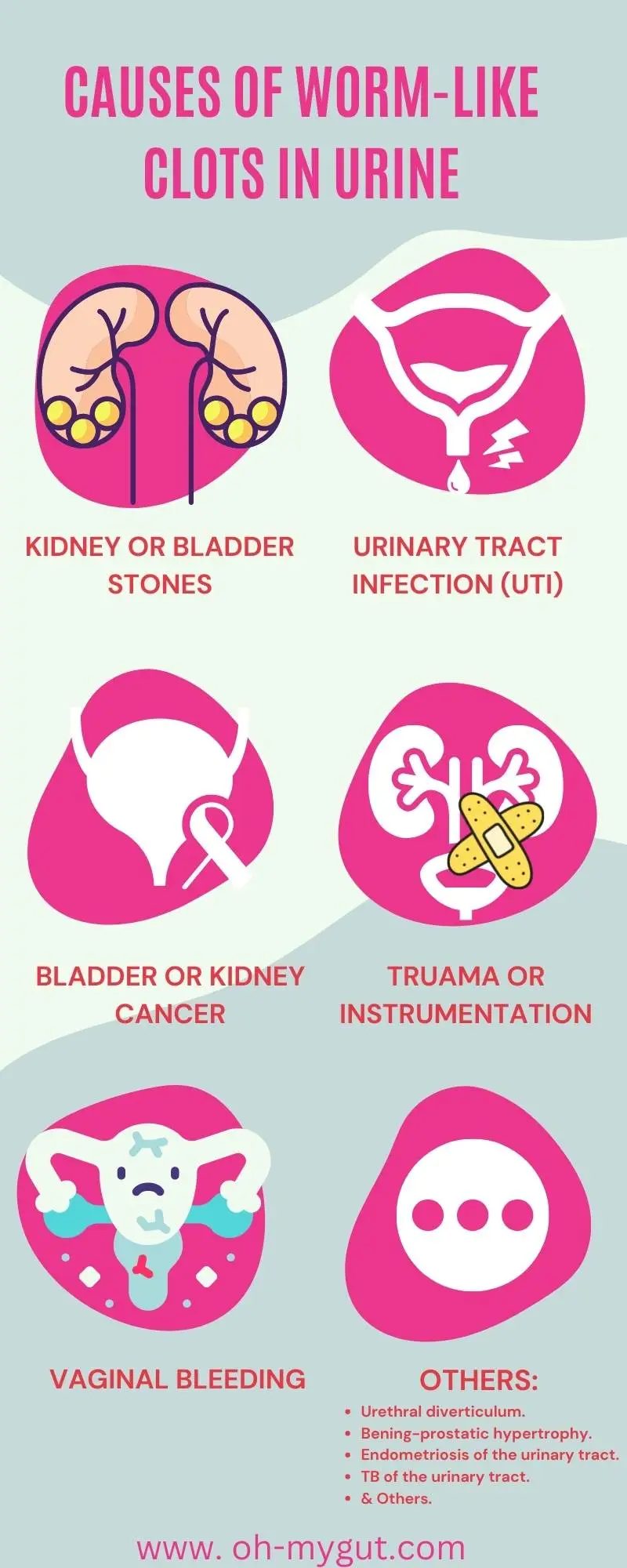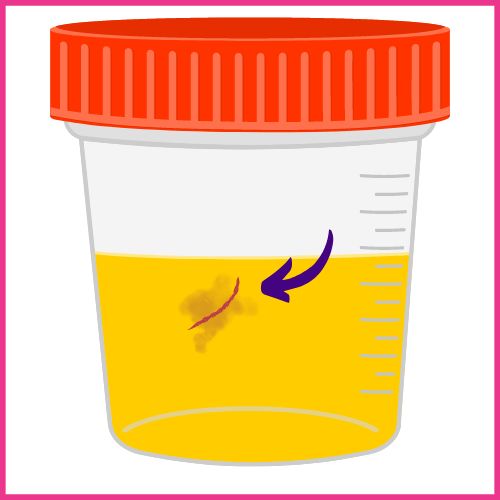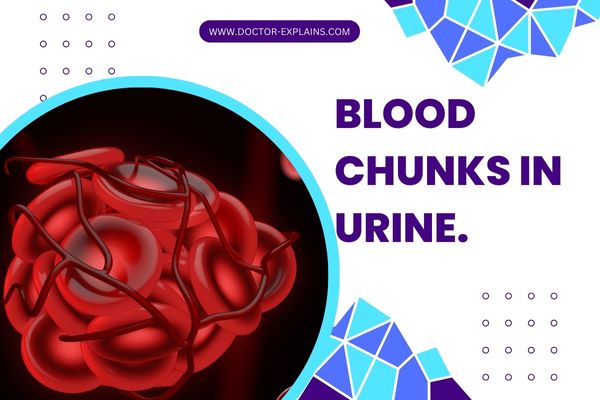5 Main Causes of Worm-Like Blood Clots In Urine
Our content is not intended nor recommended as a substitute for medical advice by your doctor. Use for informational purposes only.
Key facts about Worm-like blood clots in urine:
- The presence of worm-like blood clots in urine indicates significant (moderate to severe) bleeding inside the urinary tract.
- The most common causes include:
- Kidney, ureteric, or bladder stones.
- Urinary tract infection.
- Bladder, kidney, or ureteric cancer.
- Trauma or recent instrumentation in the urinary tract (such as urine catheters or cystoscopy).
- Others include prostatic enlargement or cancer, polycystic kidney disease, and others.
- The most common causes are stones and UTIs. The most serious cause of blood clots (chunks) in urine is cancer.
- Any unexplained worm-like blood clots in urine MUST be investigated by your doctor.

1. Urinary tract stones.
Urinary tract stones are one of the commonest causes of heavy blood in the stool (leading to worm-like or stringy blood clots in urine).
Kidney stones may cause injury when they move inside the urinary tract leading to hematuria with clots.
Common locations of the urinary tract stones:
- Kidney stones (may be asymptomatic in some cases).
- Urinary bladder stones.
- Ureteric stones.
- Urethra (rare).
Symptoms of stones in the urinary system:
- Kidney stones cause loin pain (in the flanks and upper back on both sides).
- Bladder stones often cause central pelvic pain (urinary bladder pain).
- Ureteric stones cause severe flank pain that radiates to the groin and the inner thigh.
- Some cases are completely asymptomatic and may present with isolated blood or worm-like clots in the urine.
- The pain is often sudden onset, severe, and colicky and may last minutes to hours.
- Turbid urine.
- The pain may be associated with nausea and/or vomiting.
- Heavy bleeding with blood clots in urine may also occur if the stone cause injury to any part of the urinary tract.
- Obstruction of the urine outflow can also occur in severe cases.
Urinary stones are often diagnosed by an imaging study such as an X-ray, ultrasound, or CT scan of the urinary tract.
You can learn more about urinary stones.

2. UTI.
Urinary tract infections (UTIs) are very common in females. Almost 50-60% of women will get UTI at some point in their lifetime (reference.
UTI commonly affects the urinary bladder (cystitis). When cystitis is severe, the lining of the urinary bladder may bleed due to severe inflammation. The bleeding may lead to stringy blood clots in urine in severe cases.
Causes:
- Bacteria are the most common cause of UTIs (such as E. Coli).
- Bacteria reach the urinary bladder from outside through the urethra. It reaches the urethra by contamination from the stool.
- The most common risk factors include frequent sexual intercourse, spermicide-coated diaphragms, condoms, and diabetes mellitus.
- Recurrent simple cystitis (frequent UTIs) is very common in young and healthy women.
Symptoms & diagnosis:
- Dysuria: burning or pain in the urethra when you pee.
- Urgency: sudden severe urgency to pee.
- Frequency: Frequent urge to pee but only a small amount of urine comes out.
- Suprapubic (lower abdominal) pain.
- Turbid (cloudy) urine may also be present.
- Bloody urine or blood drops at the end of urine.
- The symptoms may be very mild, with a strange feeling in the bladder and urethra.
- Also, UTI may become complicated (reaching the kidneys), causing high fever, flank pain, chills, etc.
- The diagnosis is often established by urine analysis and culture.
What to do:
UTI is a very common cause of abnormal urinary symptoms in females. Consult your doctor to confirm the diagnosis if you have symptoms consistent with UTI.
UTIs are treated mainly by antibiotics (such as Nitrofurantoin and Trimethoprim-sulfamethoxazole).
The blood clots in urine often resolve with antibiotic treatment. However, if it doesn’t go away after UTI treatment, you should tell your doctor, as it may be due to other causes.
An over-the-counter urinary analgesic such as Oral phenazopyridine may help relieve the dysuria and uncomfortable urethral sensations.
3. Bladder cancer.
Cancer of the urinary bladder is one of the common malignancies. It represents about 4.5% of all diagnosed cancers in the united states (reference).
The cancer mass inside the bladder often bleeds and may present with blood clots in urine.
You should suspect bladder cancer if you have the following:
- Risk factors for bladder cancer.
- Painless blood in the urine (Any form of hematuria, including blood clots).
Risk factors of bladder cancer (reference).
- Cigarette smoking.
- Being older (more than 50).
- Being male.
- Opium use.
- Occupation exposure to carcinogens as with metal workers, painters, rubber industry workers, leather workers, textile and electrical workers, miners, cement workers, transport operators, excavating-machine operators, and jobs that involve the manufacture of carpets, paints, plastics, and industrial chemicals.
- Genetics also plays a role.
- Schistosomiasis infection (common in north Africa and Japan).
Symptoms & diagnosis:
- Early bladder cancer may present with irritative symptoms such as painful urination (dysuria), the urgency to urinate, or frequent urination.
- Bladder cancer typically causes painless urine bleeding (intermittent attacks).
- Blood is often present throughout the urination (it may be heavy hematuria or blood clots in different shapes (small masses, strings, or worm-like red clots).
- Bladder pain or pressure in the lower abdomen.
- Dysuria or pain after the end of urination.
- Signs of metastasis may also exist, such as bone pain, abdominal pain, liver pain, headache, or blurring of vision.
- Weight loss, anorexia, and other systemic symptoms may also present.
Other types of urinary tract cancer that may cause blood clots in urine are:
- Kidney cancer.
- Prostate cancer (in men only).
- Ureteric cancer.
- Urethral cancer.
4. Trauma or recent instrumentation of the urinary tract.
Recent trauma, procedures, or catheter insertion are common causes of blood clots in urine.
Recalling any recent trauma or instrumentation of the urinary tract in the past few days before the appearance of worm-like clots in urine helps determine the cause.
Report any of the below incidents to your doctor or health care provider:
- Recent insertion of a urinary catheter.
- Trauma to the urethra during sexual activities or intercourse.
- Recent cystoscopy (a tool to visualize the bladder introduced through the urethra.
- Recent insertion of a ureteric stent (double-J stents).
- Recent operations (bladder, kidney, urethral, or prostatic).
- Taking a biopsy from the urinary bladder, kidney, or prostate.
- Blunt trauma to the perineum.
In most cases, the onset of blood clots in urine is shortly (minutes to hours) after the initial trauma). Seek immediate medical assistance in you experience blood clots after an identifiable trauma to the urinary tract.
5. Vaginal bleeding (false hematuria).
In females, Vaginal bleeding is often confused with hematuria. Many females find tiny blood clots in the toilet after urination and are unsure about their source.
Blood clots in the toilet can be either true hematuria (from the urinary tract) or false (Uterine or vaginal source).
So, always pay attention to the source of the worm-like blood clots during urination.
Common causes include:
- Menses.
- Spotting (due to hormonal fluctuations).
- Use of OCPs.
- Pregnancy.
- Ectopic pregnancy.
- Intrauterine device (IUD).
- Sexual intercourse.
- During the times before and just after menopause.
- Miscarriage (before the 20th week of pregnancy.
- Vaginal atrophy (post-menopausal).
6. Other possible (less common) causes
- Urethral diverticulum.
- Bening-prostatic hypertrophy.
- Endometriosis of the urinary tract.
- TB of the urinary tract.
- Urethral stricture.
- Pyelonephritis.
- Polycystic kidney disease.
- Arteriovenous malformations inside the urinary tract.
- Renal vein thrombosis.
- Renal artery thrombosis.
- Benign kidney tumors.
- Hydronephrosis.
- Hypercalciuria.
My Conclusions:
As a nephrologist, we are always concerned with blood clots in urine. Whenever you experience blood clots in urine, you have to search for their cause.
Often, the most common causes, such as a stone, UTI, or catheter insertion, are benign. However, seeing a doctor (urologist) is a must.
You have to worry if you have:
- Risk factors for malignancy such as older age, smoking, etc.
- Signs of blocked urine flow (urine retention) as the inability to pass urine despite the urge to urinate.
- Peeing pure blood from urine (frank hematuria).
- Severe flank or pelvic pain.
- Fever.
- Shortness of breath, dizziness, lightheadedness, or fainting attacks.
- Severe pallor.
- Fast heartbeats and extreme fatigue.
- Evidence-based
- Written by a doctor.
MD, Internal Medicine and Nephrology specialist.

Dr. Esraa A. MagidAuthor
MORE INSIGHTS





